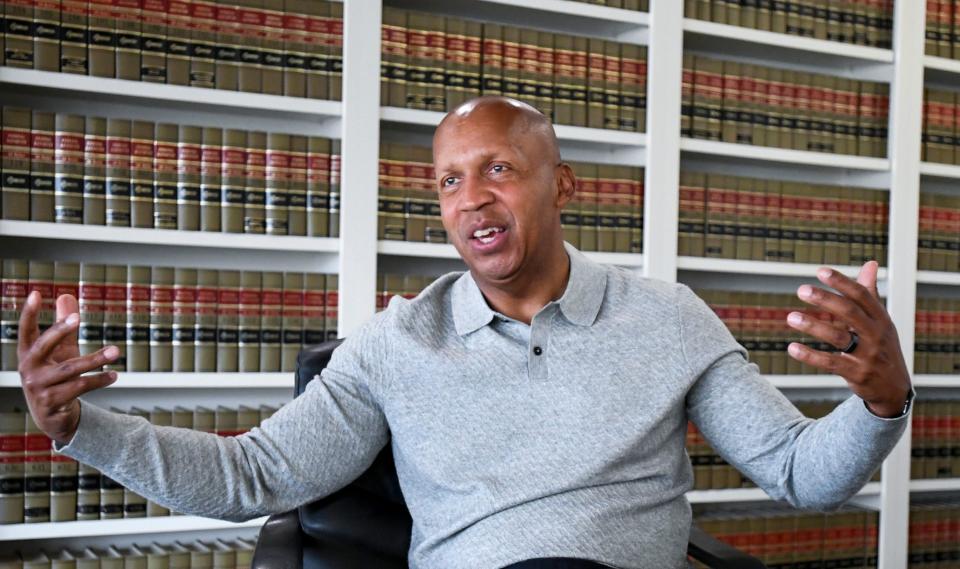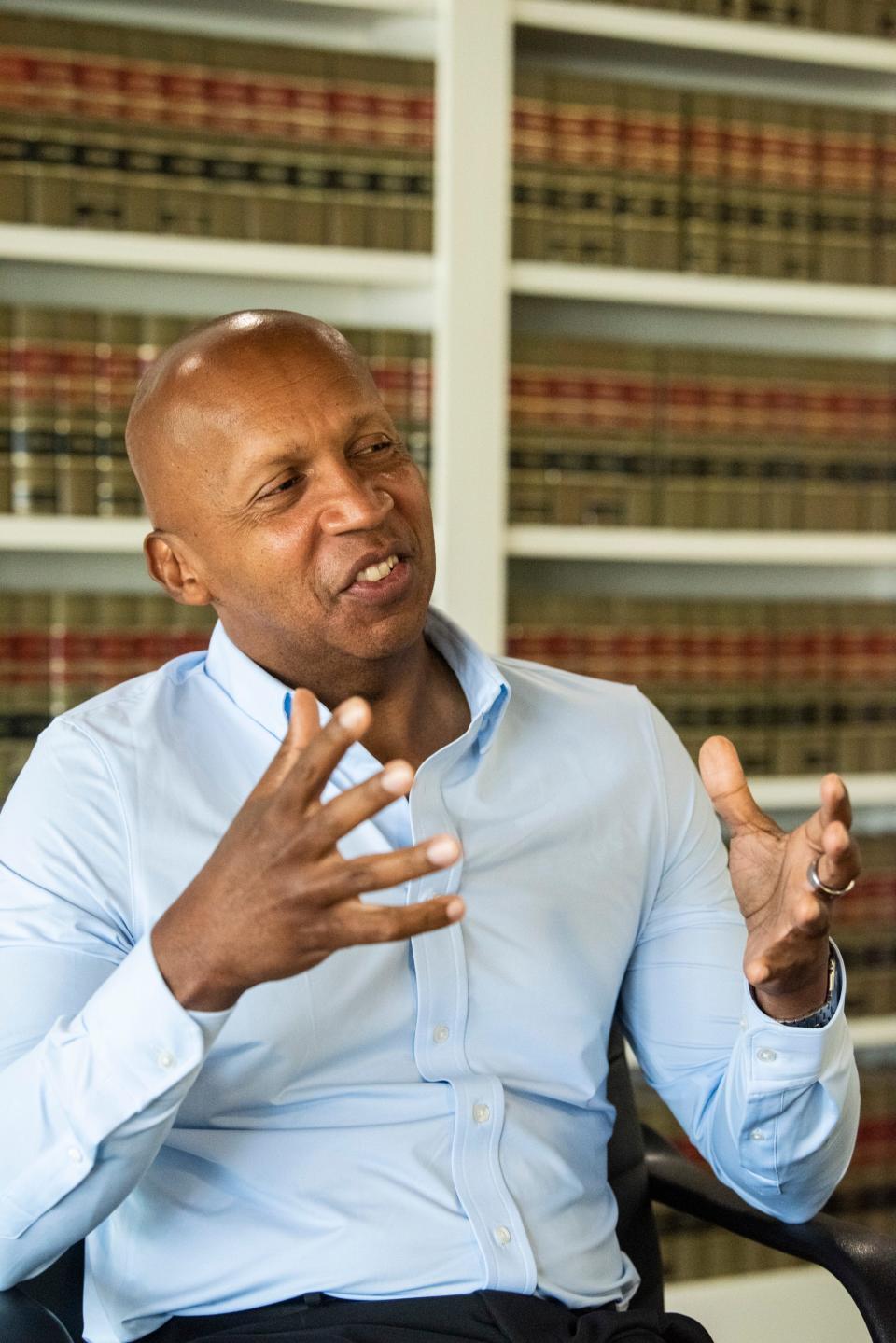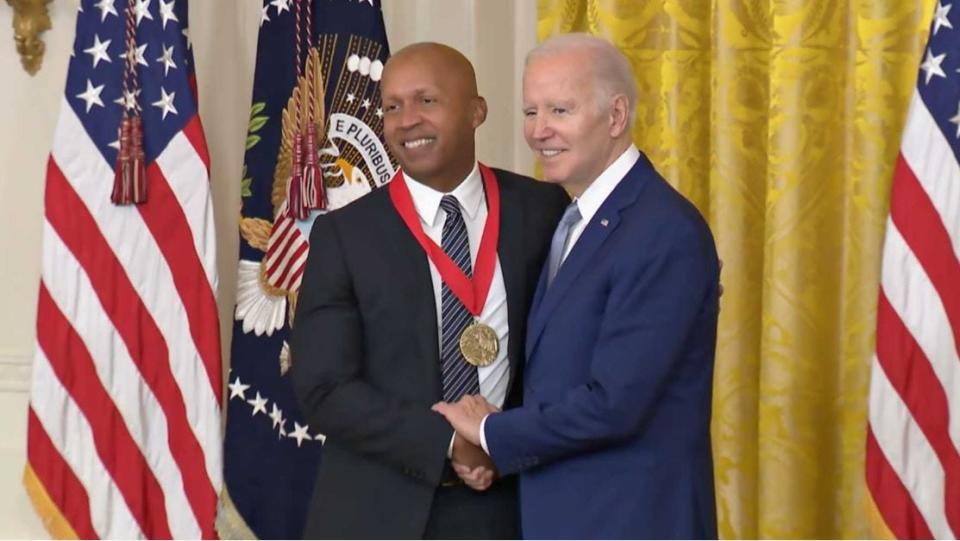Famed criminal justice lawyer Bryan Stevenson says it all began with Delaware childhood
- Oops!Something went wrong.Please try again later.
Bryan Stevenson, founder and executive director of the Equal Justice Initiative, is renowned as a lawyer, human rights activist, author and speaker. He is also a Delaware native.
Based in Montgomery, Alabama, the Equal Justice Initiative focuses on securing justice for incarcerated juveniles, the indigent and the condemned. Stevenson's legal prowess has resulted in victories in four out of the five cases he has argued before the Supreme Court. According to the nonprofit, Stevenson has won reversals, relief or release from prison for hundreds of wrongly convicted or sentenced individuals.
One of these cases took center stage in the 2019 movie '"Just Mercy," a film portraying Stevenson's relentless efforts to secure the release of an unjustly convicted Black man who was committed to death row before his trial began. Stevenson continues to make significant impacts on racial justice and the fight against inequality.
Among its many endeavors, the Equal Justice Initiative operates the Legacy Museum: From Enslavement to Mass Incarceration, an exhibition that investigates the historical connection between lynchings during the post-Reconstruction era and present-day rates of incarceration and executions among people of color in the United States. In March 2023, President Biden awarded Stevenson a National Humanities Medal for his work.
A resident of Montgomery, Alabama, Stevenson lectures widely on racial inequality, criminal justice reform and human rights. Originally from Milton, he will return to the First State as the featured guest for the Wilmington Friends School Nathan M. Clark Speaker Series on Nov. 30.
Ahead of his appearance, Delaware Online/The News Journal had the opportunity to interview the Cape Henlopen High School graduate. The discussion focused on the influence his upbringing had on his life's work, America's reluctance to confront its history and the legacy and impact of his advocacy. This interview has been edited and condensed.

Question: Was there anything about your Delaware upbringing that inspired you to pursue a career in law, particularly in social justice and human rights?
Answer: Yes. I am a product of Brown versus Board of Education. I started my education in a colored school, and then lawyers came into our community and made them open up the public school. I was really influenced by the power these lawyers had to protect the rights of a vulnerable community. These lawyers had the power to enforce our rights, and that motivated me to want to access that same power after I graduated from high school and college. So I went to law school very much to continue the legacy of social justice lawyering that had so profoundly impacted my own opportunities.
Delaware is engaged in critical discussions regarding police accountability, reforms in law enforcement rights and the death penalty. Do you perceive any connection between what is happening here, our nation's history and the contemporary structure of the criminal justice system?
Delaware is not immune from the problems created by our long history of racial injustice in the United States. I think we have all inherited this long, long history of racial bias. Narratives of racial differences have compromised our ability to do justice and to treat people fairly. The legacy of slavery created a presumption of dangerousness and guilt that got assigned to Black people, which was used to justify the extreme and horrific abuse of enslaved people. Following emancipation, that same narrative, that same presumption of dangerousness and guilt was used to justify mob violence against Black people.
So, Delaware, like other parts of the country, struggles to free itself from all of these presumptions. It doesn't matter whether you are a journalist or a doctor, a lawyer or a teacher, whether you're kind or you're loving. If you're Black or brown, you go places in this country where you have to navigate presumptions of dangerousness and guilt, and that's what creates distortions in our legal system and distrust of law enforcement.
And while we've made progress in eradicating the architecture of racial hierarchy, that presumption still exists.

Why do you believe Americans may feel uneasy about engaging with the history of America regarding racial injustice and disparity?
I think there's a long history of silence.
For generations, we have not required people to talk honestly about what happened to Indigenous people when Europeans came to this continent, when millions were killed by famine, war and disease. We have not talked honestly about the brutality and the horrors of slavery and the language that created real distortions in our view of one another because of race.
We haven't been honest about the traumatizing consequences of lynching violence and subjecting Black people to harsher punishments and treatments in our legal system, and we haven't really created space to deal with the multiple ways in which in schools and in employment spaces and in public places, you're often disfavored if you're a person of color.
And so that silence for a lot of people has become comfortable. And when you try to end the silence, start talking about things, a lot of people are made uncomfortable by that.
I think it's incredibly important that we have an era of truth-telling in the country. I would love for the children of our children to not be burdened by the presumption of dangerousness and guilt that has shaped my life and the life of the young people in my family, but to get there, we're going to have to commit to having these conversations.

What efforts can be taken to create an environment that encourages individuals to address this history with openness and willingness?
I do think there are models out there for us to emulate. When you go to Berlin, Germany, you can't go 200 meters without seeing markers and stones placed next to the homes of Jewish families that were killed during the Holocaust. You cannot graduate from high school in Germany without a clear understanding of the Holocaust in the multiple ways in which it created such harm.
There are no Adolf Hitler statutes in Berlin. There are no monuments and memorials to the perpetrators of the Holocaust. But we still have iconography throughout our country that romanticizes and even celebrates the perpetrators of these narratives of racial difference and hierarchies built on race.
I don't talk about history because I want to punish America. I talk about it because I want us to be liberated from the burdens we have inherited from the challenges we continue to see manifested in so many areas of our lives.
What long-term impact do you hope your work and the initiatives of your institution will achieve?
I think it would be just to understand that there's something better. I think there's something that feels more like freedom. More like equality, more like justice, more like liberty waiting for us in this country, but we can't get there.
If we don't have the courage to talk honestly about our past, if we don't get past the fear and anger that shaped too many of our policies when it comes to the criminal justice system, if we allow ourselves to be governed by fear and anger, we'll tolerate things we should never tolerate, we'll accept things we should never accept.
It's my hope that we can move in a different direction. One where we can see through hope, education and understanding, a path that leads to a healthier future, a more connected future and a dramatically better future for for everyone.
Wilmington Friends School's Nathan M. Clark Speaker event featuring Bryan Stevenson will be held at the Chase Fieldhouse in Wilmington from 7 to 8 p.m. Nov. 30. Admission is free, but seating is limited and tickets are required. To reserve a ticket, visit Eventbrite.
Contact reporter Anitra Johnson at ajohnson@delawareonline.com. Join her on the Facebook group Delaware Voices Uplifted. Support her work and become a subscriber.
This article originally appeared on Delaware News Journal: Roots of activist attorney Bryan Stevenson's impact began in Delaware

